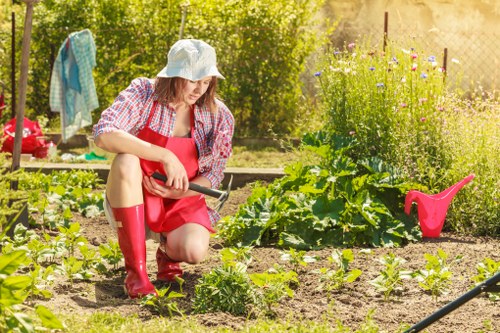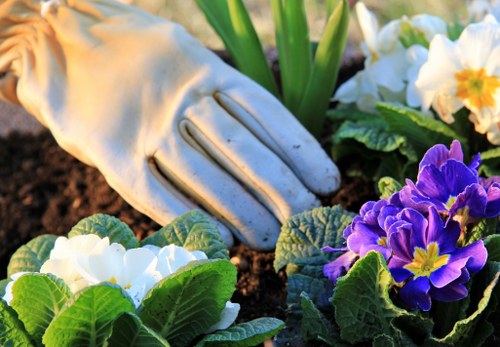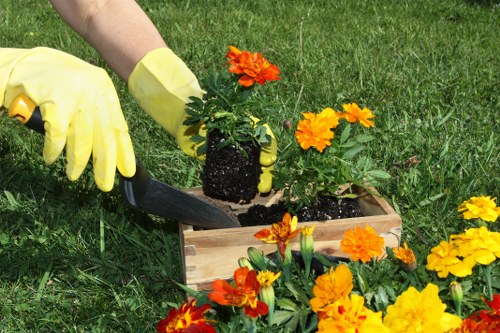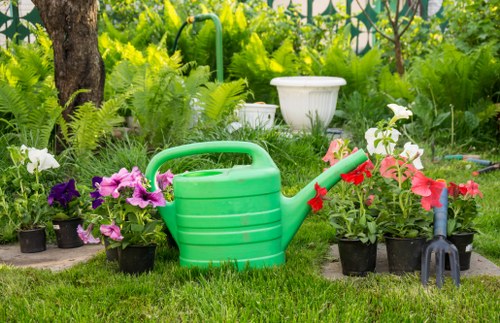Landscape Gardening in Forest Gate

Welcome to the enchanting world of landscape gardening in Forest Gate, where natural beauty meets innovative design. Forest Gate, known for its vibrant community and lush green spaces, provides the perfect backdrop for creating stunning outdoor environments.
Whether you're a seasoned gardener or a beginner looking to transform your outdoor space, understanding the unique aspects of landscape gardening in this area is essential. From selecting the right plants to designing functional and aesthetically pleasing layouts, this guide will walk you through everything you need to know.
In this article, we'll explore the best practices, tips, and resources available to help you create a beautiful garden that complements the natural surroundings of Forest Gate.

Understanding the Climate and Soil of Forest Gate
Forest Gate enjoys a temperate climate, which is conducive to a wide variety of plants. The key to successful landscape gardening here lies in understanding the local climate conditions and soil types.
The region experiences mild winters and warm summers, allowing for both perennial and annual plants to thrive. It’s important to select plants that are well-suited to these conditions to ensure they remain healthy and vibrant throughout the year.
Soil quality can vary, but generally, Forest Gate has loamy soil, which is ideal for gardening. However, conducting a soil test is recommended to determine pH levels and nutrient content, enabling you to make necessary amendments for optimal plant growth.

Choosing the Right Plants for Your Garden
When it comes to landscape gardening in Forest Gate, plant selection is crucial. Here are some popular choices that thrive in this area:
- Perennials: Lavender, hostas, and daylilies provide long-lasting beauty and are relatively low-maintenance.
- Annuals: Marigolds, petunias, and impatiens add vibrant colors and can be changed seasonally.
- Shrubs and Trees: Boxwood, hydrangeas, and ornamental trees like Japanese maple enhance the structural aspect of your garden.
Incorporating a mix of these plants can create a balanced and visually appealing landscape that requires minimal upkeep.

Designing Your Garden Layout
Effective garden design combines functionality with aesthetic appeal. Here are key elements to consider when planning your landscape garden in Forest Gate:
- Space Utilization: Assess the available space and decide on areas for planting, seating, and pathways.
- Plant Arrangement: Group plants with similar light and water requirements together for easier maintenance.
- Focal Points: Incorporate elements like water features, sculptures, or a beautiful tree to draw attention and add interest.
Using these principles, you can create a harmonious garden that is both practical and beautiful.

Incorporating Sustainable Practices
Modern landscape gardening emphasizes sustainability. Implementing eco-friendly practices not only benefits the environment but can also reduce maintenance efforts. Here are some sustainable strategies:
Rainwater Harvesting: Collecting and using rainwater for irrigation conserves water and reduces utility bills.
Native Plants: Choosing native species supports local wildlife and requires less water and care.
Composting: Recycling garden waste into compost enriches the soil and promotes healthy plant growth.
Seasonal Gardening Tips
Adapting your gardening practices to the seasons ensures your garden remains vibrant year-round.
Spring
Plant new flowers and shrubs as the weather warms. It's also a great time to prepare your garden beds by enriching the soil with compost.
Summer
Focus on watering, weeding, and deadheading plants to encourage continuous blooming and prevent pests.
Autumn
Clear fallen leaves, plant bulbs for spring, and protect delicate plants from early frosts.
Winter
Prune trees and shrubs, and plan your garden layout for the upcoming year while enjoying the serene winter landscape.
Hiring a Professional Landscape Gardener in Forest Gate
If managing your garden becomes overwhelming, consider hiring a professional.
Professionals bring expertise in design, plant selection, and maintenance, ensuring your garden remains healthy and beautiful with minimal effort on your part.
Contacting a local expert can provide tailored solutions that fit your specific needs and preferences, making the gardening experience enjoyable and stress-free.
DIY vs. Professional Services
Deciding between a DIY approach and hiring professionals depends on several factors:
- Budget: DIY gardening can be more cost-effective but may require more time and effort.
- Expertise: Professionals offer specialized knowledge that can enhance your garden's design and health.
- Time: If you have a busy schedule, professionals can maintain your garden efficiently.
Evaluate your priorities to choose the best option for your landscape gardening in Forest Gate.
Maintaining Your Landscape Garden
Regular maintenance is key to a thriving garden. Here are essential tasks to keep your garden in top shape:
- Watering: Ensure plants receive adequate water, especially during dry periods.
- Weeding: Remove unwanted plants to prevent competition for nutrients.
- Pruning: Trim overgrown branches and dead foliage to promote healthy growth.
- Fertilizing: Provide necessary nutrients to support plant vitality.
Consistent care will enhance the beauty and longevity of your landscape.
Enhancing Your Garden with Accessories
Adding garden accessories can elevate the overall appeal and functionality of your space. Consider the following:
- Seating Areas: Benches or outdoor furniture create inviting spaces for relaxation.
- Lighting: Solar or LED lights illuminate pathways and highlight garden features at night.
- Water Features: Fountains or ponds add a soothing element and attract wildlife.
- Garden Art: Sculptures or decorative elements personalize your garden and add character.
These additions not only enhance aesthetics but also increase the usability of your garden.
Seasonal Planting Calendars
Using a seasonal planting calendar helps you plan and execute your gardening tasks efficiently. Here's a basic outline for Forest Gate:
- Spring: Plant bulbs, perennials, and start seeds indoors.
- Summer: Maintain watering schedules, mulch beds, and plant heat-tolerant species.
- Autumn: Plant shrubs, divide perennials, and prepare the garden for winter.
- Winter: Protect plants from frost, plan next year's garden, and perform equipment maintenance.
Adhering to a planting calendar ensures your garden remains healthy and productive throughout the year.
Local Resources and Support
Forest Gate offers various resources to support your landscape gardening endeavors:
- Nurseries and Garden Centers: Access a wide range of plants, tools, and gardening supplies.
- Community Gardens: Join local gardening groups to share knowledge and resources.
- Workshops and Classes: Enhance your skills through educational programs offered by local experts.
Leveraging these resources can enrich your gardening experience and provide valuable support.
Common Challenges and Solutions
Every gardening enthusiast faces challenges. Here are common issues in landscape gardening in Forest Gate and how to address them:
- Pest Control: Use organic pesticides and encourage beneficial insects to manage pests naturally.
- Disease Management: Implement proper sanitation and select disease-resistant plant varieties.
- Water Management: Install efficient irrigation systems and use mulches to retain soil moisture.
Proactive management and timely interventions can mitigate these challenges effectively.
Integrating Hardscapes
Incorporating hardscapes like patios, walkways, and garden walls can add structure and functionality to your landscape.
Materials such as stone, brick, and wood offer durability and aesthetic appeal. Properly integrated hardscapes complement the greenery and enhance the overall design of your garden.
Consider the layout and flow of your outdoor space to ensure that hardscapes blend seamlessly with the natural elements.
Creating Wildlife-Friendly Gardens
A wildlife-friendly garden supports local fauna and promotes biodiversity.
- Native Plants: Provide food and habitat for birds, insects, and other wildlife.
- Water Sources: Install birdbaths or small ponds to attract wildlife.
- Shelter: Use shrubs and trees to create nesting sites and protection for animals.
By fostering a habitat-friendly environment, your garden becomes a sanctuary for various species, enhancing its natural beauty.
Budget-Friendly Gardening Tips
Creating a beautiful landscape doesn't have to break the bank. Here are some budget-friendly tips:
- Plan Ahead: Careful planning minimizes waste and reduces unnecessary expenses.
- Start Small: Begin with a manageable area and expand your garden gradually.
- DIY Projects: Build your own garden structures and accessories to save costs.
- Reuse and Recycle: Repurpose materials for garden beds, paths, and decorations.
These strategies allow you to create a stunning landscape without a hefty investment.
Lighting Your Landscape
Proper lighting enhances the beauty and safety of your garden.
Types of Lighting: Use a combination of ambient, task, and accent lighting to highlight different areas.
Solar-powered lights are an eco-friendly option, while LED lights offer energy efficiency and long lifespan.
Strategically placing lights along pathways, near seating areas, and to highlight plant features can transform your garden in the evenings.
Seasonal Maintenance Checklist
Keeping a seasonal maintenance checklist ensures that no tasks are overlooked:
- Spring: Clean garden beds, prune trees, and plant new specimens.
- Summer: Monitor for pests, maintain irrigation systems, and deadhead flowers.
- Autumn: Remove fallen leaves, plant bulbs, and prepare plants for winter.
- Winter: Protect sensitive plants, plan next year's garden, and perform tool maintenance.
Following this checklist helps maintain a healthy and attractive garden throughout the year.
Choosing Sustainable Materials
Opting for sustainable materials in your garden reduces environmental impact and promotes longevity.
Organic Mulches: Recycled wood chips and compost improve soil health and retain moisture.
Reclaimed Wood: Use reclaimed wood for garden beds, fences, and pathways to add rustic charm.
Eco-Friendly Furniture: Select furniture made from sustainable resources like bamboo or recycled plastics.
Final Thoughts on Landscape Gardening in Forest Gate
Embarking on a landscape gardening journey in Forest Gate offers endless possibilities to create a personalized and beautiful outdoor space.
By understanding the local climate, selecting suitable plants, and incorporating sustainable practices, you can cultivate a garden that not only looks stunning but also supports the local ecosystem.
Whether you choose to manage your garden yourself or seek professional assistance, the key lies in passion, planning, and continuous care.
Ready to transform your outdoor space? Contact us today to start your landscape gardening project in Forest Gate!